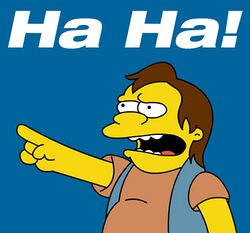
Ha Ha!
Ha Ha!
| ||||||
Catchphrase Information
|
Ha Ha! (sometimes spelled Haw Haw!) is Nelson's catchphrase and distinctive laugh. Nelson says the laugh with the emphasis on the first "Ha," so it sounds like "HA-ha!"
Nelson usually uses the laugh when something bad happens to another character. Sometimes, after he uses the laugh, he says why he is laughing at the person. For example, he says, "Ha ha! Your dad's not handy!" to Bart after his ten-speed bike (which Homer had assembled) fell apart while Bart was riding it.[1]
Sometimes Nelson laughs for so long at a time that his voice gets really tired and croaky.[2]
Nelson seems to think that using the laugh gets him off the hook if he happens to cause something bad to happen to another person. For example, Nelson pranked Bart into falling out of a tree and used the laugh after Bart hit the ground. It turned out that Bart had broken his leg. When Milhouse pointed out that Bart was really hurt, Nelson protested, "I said 'Ha-ha'!"[3]
Nelson has been known to use his laugh in other media, such as on Facebook[4] and carving it in wooden letters in shop class.[5]
Contents
Variations
Reversed
When Nelson laughs at Homer while he (Homer) is having a chili-pepper-induced hallucination, Homer hears the laugh with the emphasis reversed: "Ha-HA!"[6]
Four "Ha"s

|
The contents of this article or section are considered to be non-canon and therefore may not have actually happened or existed. |
When Nelson appears as a young Beethoven, his laugh has four "Ha"s and he sings it so that it sounds like the opening notes of Beethoven's Fifth Symphony: "Ha-ha-ha-haaaaaaa, ha-ha-ha-haaaaaaa!"[7]
Question
Sometimes Nelson will start the laugh, and then partway through realize that the joke is actually on him, and the laugh comes out sounding like a question: "Ha-HA?" [8]
Battle Cry
Nelson uses his laugh as a battle cry when he helps Bart and Lisa defend their box fort from a horde of American Shipping Services delivery people.[9]
Canadian
The Canadian Nelson says "Hoo Hoo!"[10]
Irish
The Irish Nelson says "Har Har!"[11]
See-Saw
When Bart jumps on the see-saw and the rubbish bag on the other side lands on him, Nelson says "See-Saw" in the same sort of way as "Ha Ha!.[12]
Nelson trips up Facebook founder Mark Zuckerberg in a roller-skating rink. Zuckerberg falls and hurts himself and updates his status on Facebook to "is in intense pain". Nelson replies, posting "Haw Haw!"[4]
Uses by Other Characters
- Mrs. Muntz has been known to use the laugh.[2]
- Nelson laughed at a tall man driving a Volkswagen. The man got out of his car, confronted Nelson and lectured him. He then turned the tables on Nelson by making him walk down the street with his pants pulled down around his ankles while everyone in Springfield laughed at him.[13]
- When Springfield Elementary School had a medieval festival, Nelson laughed when Mrs. Krabappel announced that Martin Prince would be the king. Mrs. Krabappel, for her part, said that Nelson would be one of the king's guards, and laughed at him when he looked shocked.[14]
- When Bart had a string of pranks backfire (they ended up helping people instead of causing trouble), Reverend Lovejoy laughed at Bart when he grumbled that every time he tried to do evil, he ended up doing good.[5]
Appearances

|
This article or section is incomplete.
|
|
References
- ↑ "I, (Annoyed Grunt)-bot"
- ↑ 2.0 2.1 The Simpsons Movie Cite error: Invalid
<ref>tag; name ".5B.5BThe_Simpsons_Movie.5D.5D" defined multiple times with different content - ↑ "Bart of Darkness"
- ↑ 4.0 4.1 "Loan-a-Lisa"
- ↑ 5.0 5.1 "500 Keys"
- ↑ "El Viaje Misterioso de Nuestro Jomer"
- ↑ "Margical History Tour"
- ↑ "Boy-Scoutz 'N the Hood"
- ↑ "Rome-Old and Julie-Eh"
- ↑ "Boy Meets Curl"
- ↑ "In the Name of the Grandfather"
- ↑ "The Debarted"
- ↑ "22 Short Films About Springfield"
- ↑ "The Father, The Son, and The Holy Guest Star"

